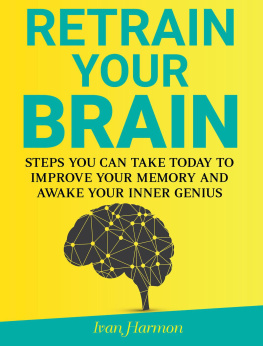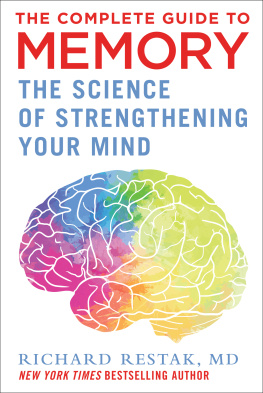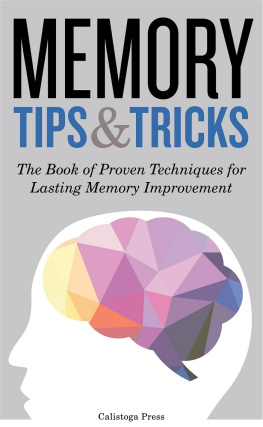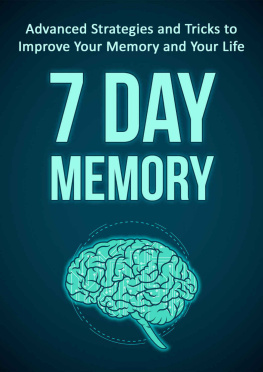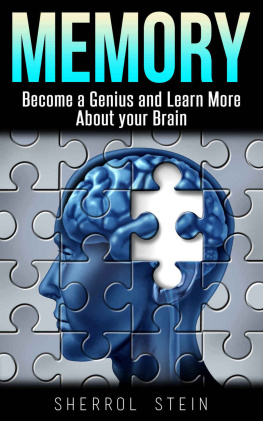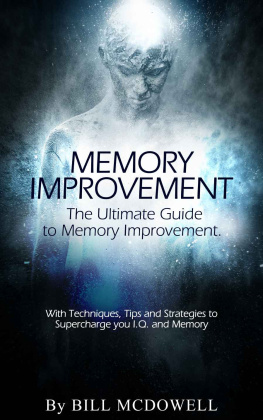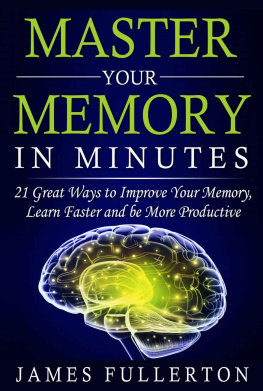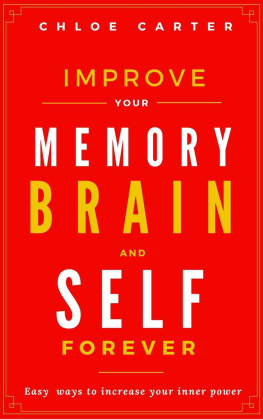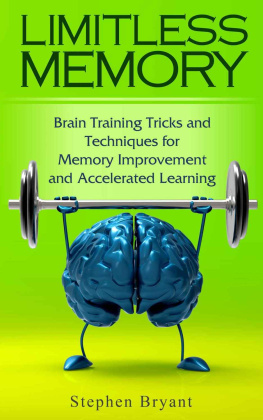Retrain Your Brain
Steps You Can Take Today to Improve Your Memory and Awake Your Inner Genius
Ivan Harmon
TABLE OF CONTENTS
SECTION ONE: THE KEY TO MEMORY
Introduction - On Becoming Smarter
B eing smart puts a person at a serious advantage in life. Intelligence makes it possible for us to find creative solutions to problems and make life easier. Intelligence allows us to build new technology, educate others, and provide answers to questions.
Some people think their problems would evaporate if they were a little smarter. These same people often assume that we cant get any smarter because intelligence is something we were or were not born with. That means that if someone isnt the sharpest tool in the shed, theres no room for improvement.
Im here to tell you that this isnt true. Being smart isnt about what you were or werent born with. Being stupid isnt a curse that youre stuck with for life.
Just like any other ability, you can gain intelligence. Human beings are amazing creatures, full of potential and an endless capacity to learn. This means that you can learn to become smarter, better, and faster at anything you want to do.
What Does It Mean to Be Smarter?
When we talk about being smarter, we might think of having more knowledge or a greater than average ability to solve problems. But what makes a person able to do this? Why are some people better at this than others?
Contrary to popular belief, it isnt simply inherent talent. It is technique and habit above everything else. People who seem smarter have simply developed techniques for remembering more of what they learn, and they use their experience and knowledge to solve problems and find answers. The better they get at this process, the smarter we perceive them to be.
That means if you want to be smarter, you dont have to pray for better DNA. You have to improve your skill sets. You have to become better at remembering things and creatively applying your knowledge to new situations and concepts. This book will focus on the first part of your journey to become smarter. Here, we will talk about improving your memory because without a good memory, you wont get any smarter. Being able to remember what you learn is the first and most important step.
What Exactly is Memory?
By dictionary definition, memory is a combination of processes that aids us in encoding, storing, and retrieving information (Rathus, Maheu, & Veenvliet, 2014). What that means is memory is not a one-stop process that you have or dont have; its a combination of processes. Your brain must be able to take in new information, comprehend it, retain it, and then be able to recall it. That is what memory is.
These are processes that can be developed and enhanced through correct application of techniques and practice, which means that anyone can have a great memory if they work at it.
In order to be able to enhance and improve our memory-abilities, lets take a closer look at each part of the overall process.
Encountering Information
Every day, we encounter a lot of information through our five senses. We are constantly seeing, hearing, smelling, touching, and even tasting things that send signals and information to our brains. However, we dont remember all of it all the time. Thats because our ability to remember things is greatly dependent on the focus we place on them.
This means that the first part of being able to remember anything is focus . Our attention to what we are experiencing will determine whether or not we will remember it and how much of it we can remember.
Encoding
Once we encounter new information, it is up to us to absorb it. Your brain encounters a ton information every day, but it will only absorb what you pay attention to and what it can comprehend.
For our brains to successfully store information and remember it, we have to take that information and process it in a way that it can be stored. This is what it means to encode information. To get a better understanding of this concept, think of your brain as a computer.
When you compose a Word document and save it, it becomes saved on your computers hard drive. If you were to take that computer and open it up, you wouldnt find this Word document hidden inside your computers components. That file is saved in the form of code and electric signals on the hard drive of the computer it is encoded. To retrieve it, you have to leave your computer intact and search for the file in your computers directory.
Likewise, the brain has to do the same for information that it receives. We process it in a way that makes it stick and be kept in our memory files.
Our brains have several ways to encode information. Some are more effective than others.
To understand what Im about to explain, try this exercise first:
0.1
Look at the letters in this list for about 20 seconds. Then, cover this page and try to recall the letters. Write down what you remember.
T T Y L R O F L T G I F
Think about what you just did. Were you able to successfully recall all of the letters?
When it comes to encoding information for memory, there are three common types of codes we use to retain the information. One is visual. If you looked at the list of letters and tried to take a mental picture of it, you used a visual code.
The other is auditory. If you said the letters out so you could hear yourself, you used an acoustic code. You tried to memorize the list of letters by sound.
The last is semantic. Semantic codes are codes where we attach meaning to things in order to encode them in our brains. In this case, you might have seen TTYL ROFL TGIF, recognizing them to be common acronyms of modern dialect. By doing that, you would have been able to easily recall all twelve letters on this list.
When it comes to optimal memory, learning ways to use this last method of encoding is a guaranteed way to boost your skills. We will be focusing on the techniques of semantic encoding very heavily in this book.
Again, encoding information is crucial to being able to store information in your brain and being able to recall it when you need it.
Storing
Once youve found a way to encode the information you want to remember, the next step is to store it. How do you do that? By rehearsing it in your mind. There are two main ways to do this. The first way is called maintenance rehearsal. This is when we repeat something to remember it, like saying the list of letters over and over again. This works okay for short-term memory but it doesnt do much for your long-term storage.
The second way is called elaborative rehearsal. This is when we connect what we are trying to remember with something that already has meaning in our existing memory. For example, if you looked at the example list and saw TTYL, you probably also associated that with the words talk to you later.
Next page
